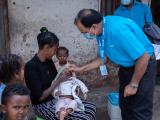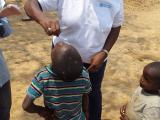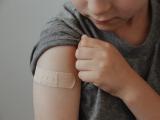Jun 7, 2012
Unusual circumcision ritual cited in infant herpes cases
Out-of-hospital ritual Jewish circumcision involving oral-genital contact may have led to 11 cases of lab-confirmed herpes simplex virus (HSV) infections in the past decade in newborns, including two deaths, investigators from the New York City Department of Health and Mental Hygiene (DOHMH) reported today. Writing in Morbidity and Mortality Weekly Report (MMWR), the researchers said that from November 2000 through December 2011, 10 of the 11 infants were hospitalized after their ritual circumcision included an ultra-Orthodox Jewish practice known as metzitzah b'peh. In this ritual, the circumciser, or mohel, places his mouth directly on the newly circumcised penis and sucks away blood from the wound. In six of the cases orogenital suction was confirmed via parental reports, and in the remaining cases the practice was determined to be probable. The team determined the risk of HSV infection to boys undergoing the
practice to be 1 in 4,098 circumcisions, or 3.4 times higher than with circumcision without orogenital suction. The report also noted that HSV in infants can result in death or permanent disability. An editorial accompanying the report said that preventing the practice is difficult given that it's performed outside a healthcare setting but that circumcisers should be educated about the risks. The editorial also said that some ultra-Orthodox circumcisers suction blood without orogenital contact and that 73% of New York City adults 20 and older are estimated to be infected by HSV.
Jun 8 MMWR report
Polio cases reported in formerly polio-free Nigerian state
Nigeria has reported five new cases of polio in Kaduna state, an area that had been free of the disease for 3 years, the News Agency of Nigeria (NAN) reported yesterday. The cases were disclosed last week during vaccination efforts. "Nigeria had achieved 95% reduction in polio cases in 2010, and Kaduna state had consistently remained polio-free until now," said Alhaji Mustapha Jumare, the country's immunization chair. He said the spread of polio to the state was worrisome and urged parents to have their children immunized. He specifically urged Zamfara and Kano states to ramp up vaccination drives to halt further spread of the virus to Kaduna. In announcing an emergency plan last month to combat polio, the World Health Organization (WHO) reported that cases in Nigeria increased 185% from 2010 to 2011 and said the country "represents an imminent risk to west and central Africa."
Jun 6 NAN story
May
25 CIDRAP News story on the WHO emergency plan



















